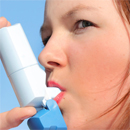 Asthma is a chronic condition that involves inflammation of the airways that are responsible for normal breathing. When you have an asthma attack, the muscles surrounding your airways tighten, making it difficult to breathe. This can causes wheezing, coughing, shortness of breath and tightness of your chest. Allergic reactions are a common trigger for asthma attacks. The severity of symptoms can range from mild to severe depending on the person. It is imperative that you take preventative steps to help minimize the risk of suffering an asthma attack.
Asthma is a chronic condition that involves inflammation of the airways that are responsible for normal breathing. When you have an asthma attack, the muscles surrounding your airways tighten, making it difficult to breathe. This can causes wheezing, coughing, shortness of breath and tightness of your chest. Allergic reactions are a common trigger for asthma attacks. The severity of symptoms can range from mild to severe depending on the person. It is imperative that you take preventative steps to help minimize the risk of suffering an asthma attack.
Your Immune System and Allergic Reactions
Advertisement
The main job of your immune system is to protect your body from viruses and bacteria that you’re exposed to. In individuals that are prone to allergic reactions the antibody IgE that is part of the immune system is overly reactive meaning that it attacks substances that aren’t harmful. These substances are referred to as “allergens”. IgE antibodies cause the body to suffer allergic reactions when its’ exposed to these allergens. Common substances that cause allergic reactions are: pollen, dust mites, mold, pet dander, cockroach feces, and many others. Additionally, exposure to environment irritants can also trigger an asthma attack. Common irritants include cigarette smoke, dust, strong chemicals and perfumes, cold air and air pollution. Common symptoms of allergic reactions include sneezing, a runny nose, and itchy eyes. If you suffer from asthma, many of these allergens and irritants may trigger an asthma attack. It is important to take preventative measures to avoid having a potentially serious asthma attack.
RELATED READING: The Down Low on Cigarette Alternatives
Preventing Asthma Naturally
If you suffer from allergies and asthma, there are a number of preventative steps you can take to reduce your chance of exposure to allergens and irritants, including:
1. Stay away from cigarette smoke – this is the most important preventative step that you can take as cigarette smoke is a serious trigger for most people with asthma
2. Keep furry pets out of your home
3. Use mattress and pillow covers to reduce exposure to dust mites
4. Replace carpet with hardwood, laminate or an easy to clean floor covering
5. Vacuum your home regularly
6. If you have mold in your home, get it removed
7. Keep the humidity level in your home between 35-50%
8. Fix leaks in your home as leaks allow mold to form
9. Pay attention to air quality readings and limit your time outdoors if the air quality is poor
10. Use unscented personal hygiene and cleaning products
Advertisement
Some of these preventative tips require effort and money to correct, but they will be worth it in the long run if you or a loved one suffers from allergic asthma.
Normal immune system responses are vital in protecting you against serious infection however, if your immune system is overly reactive it can cause you to suffer from allergic reactions. If these allergic reactions cause you to suffer an asthma attack, you are potentially at risk of serious problems. It is therefore important that you take preventative measures to avoid substances and situations that may trigger a reaction. By utilizing the preventative recommendations mentioned in this article, you will be minimizing your risk of suffering from a serious asthma attack
Related Reading: Waiting to exhale: Breathing exercises for anxiety, asthma and more
